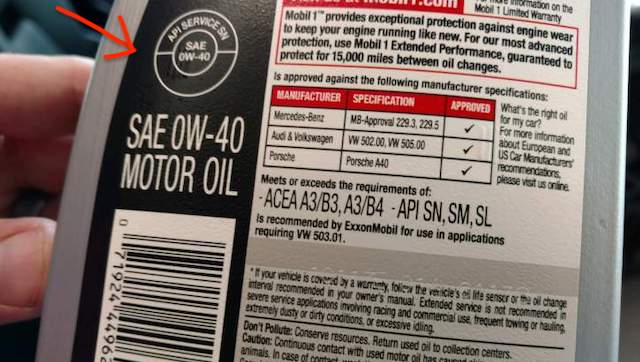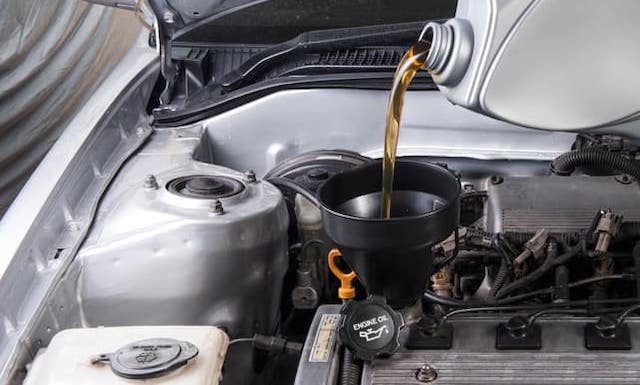A Guide To API Ratings For Motor Oil
There are so many different motor oil brands on the market. How do we know which brands are the right ones to put into our engines? Just look for the seal of approval with the API rating.

API stands for the American Petroleum Institute. The organization evaluates every blend of motor oil. It assigns an API rating to motor oil blends that meet ILSAC’s current standards. ILSAC stands for International Lubricant Standardization and Approval Committee. U.S. and Japanese automobile manufacturers run the committee.
The API rating is a great way to determine whether the motor oil is safe to use in your engine.
First Things First: What Does An API Rating Include?
A seal of approval with an API rating means that the oil meets the minimum performance standards set by auto manufacturers. An API rating has one of the following formats:
- Two letters starting with an S: This indicates that the oil is for gasoline engines
- Two letters starting with a C, followed with a “-4”: This indicates that the oil is for diesel engines
Why are there variations? Why can’t there be one set of letters to show whether a motor oil blend is for gasoline or diesel engines? It’s because API ratings change every now and then.
Why Do API Ratings Change?
The only purpose of motor oil is to lubricate the engine. Engine parts evolve over time, so motor oil has to evolve, too. When auto parts manufacturers develop better parts, these parts may need oil with:
- Better viscosity
- Better protection
- More compatibility with the new parts
Every time motor oil is updated along with the engine parts, its API rating changes.
It’s important to make sure you’re getting fresh motor oil with the most recent API rating. If your car is less than 15 years old, you can get motor oil with an API rating that matches your car’s age. Keep in mind that the older the API rating, the higher the chance the oil is expired.
Why Expired Oil Is Bad News
A lot of people don’t realize this, but motor oil expires. Oil degrades while it’s sitting unused. When you put expired oil into your engine, it won’t lubricate your engine as well as it should. You’ll end up risking premature wear.
What If You Have An Older Engine?

If you’re facing this dilemma, we have good news. You can use newer motor oil with a more recent API rating. Newer motor oil blends are backwards compatible. That means they work just fine in older engines. You can’t say the same thing about older API ratings. They’re not compatible with newer engines. It’s because motor oil with older API ratings can’t handle the heat generated by newer engines. Heat causes the oil to degrade quickly, and once it degrades it can’t lubricate the engine well enough. If you use motor oil with an API rating for engines older than yours, your engine will wear prematurely.
Which API Ratings Are Current? Which Are Obsolete?
There’s a long list of API ratings and the time period for which they were created. To keep it simple, let’s talk about the current ones.
Current API Ratings For Gasoline Engines
- SN: For vehicles manufactured after 2010
- SM: For vehicles manufactured between 2004 and 2009
- SJ: For vehicles manufactured between 2001 and 2004
All the other API ratings (between SH and SA) are obsolete. So even if you have an engine that’s older than 2001, you may want to avoid these ratings. It’s always wiser to use the most current API rating for two reasons:
- Fresh motor oil
- Compatibility with your engine
Motor oil with any of the current API ratings should still be good to use. If you’re using motor oil with an SJ API rating, proceed with caution. There’s a chance that the oil has expired.
Current API Ratings For Diesel Engines
- CJ-4: For four stroke high speed diesels manufactured after 2010
- CI-4: For vehicles manufactured between 2002 and 2010
- CH-4: For vehicles manufactured between 1998 and 2002
Any other API rating is obsolete. It’s always best to use a current rating to ensure reliable lubrication in your engine.
SN: The Latest API Rating For Gasoline Engines

The latest API rating for gasoline engines is “SN”. It brings several benefits over the previous API rating. Such benefits include:
- Improved fuel economy
- Improved life of emissions system components
- More stringent sludge, deposit, and oxidation control
- Better low-temperature viscosity
- High- and low-temperature corrosion protection
- Better turbocharger protection
- Improved filter clogging protection
- Seal compatibility
Do you have any questions about API ratings that weren’t addressed in this guide? We’ll be happy to answer them if you get in touch with us!
